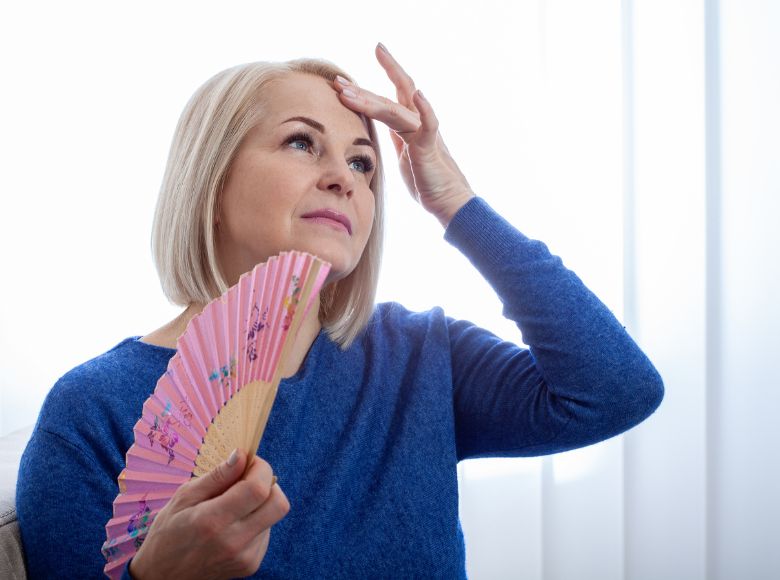All the women in your life warned you about the menopause.
The sleepless nights, hot flashes, and dry skin are annoying, but they’re no big surprise.
What’s a shock is how darn tired you feel. You’re keeping more and more to-do lists to keep track of your life because you can’t think straight. You find so many minor things irritate you, and as for your appearance – weight gain despite dieting and the thinning hair is so frustrating!
But what if these symptoms had less to do with the menopause and more to do with how your adrenal glands and thyroid struggle to swing with the changes?
Hashimoto’s and Menopause – What Does It All Mean?
The purpose of your ovaries is to ripen your eggs and release estrogen over your monthly cycle, but when you reach middle age, this function begins to wind down. Your body is used to receiving most of the estrogen it needs from these two little powerhouses. But as you grow older, your body eases up on preparing for reproduction – your egg supply has dwindled, and it’s time to begin a new stage in your life.
Your body needs estrogen not only for reproduction: it’s a powerful hormone that aids weight management, bone health, the maintenance of your brain – and a smoothly running thyroid. So, when your estrogen production changes during pregnancy or menopause, this puts you at a higher risk of developing hypothyroidism, including Hashimoto’s disease. While your body switches over and relies on your adrenal glands to supply estrogen, if they’re already working on overdrive due to your busy lifestyle, your adrenal glands may be unable to keep up, and your thyroid suffers.
Hypothyroidism is also known as an underactive thyroid. Hashimoto’s disease is classed as an autoimmune disorder: your thyroid is under-functioning because your immune system has begun to attack it, destroying it from the inside. Horrible, right? Autoimmunity happens when your immune system mistakes body tissues for harmful invaders – and once triggered, this mistaken response can’t be turned off, as the otherwise healthy cells and tissues are tagged for destruction by your immune system, like trees waiting to be cut down in the forest.
But while there are no easy cures for autoimmunity, including Hashimoto’s, there are ways you can turn the condition around and keep it tamed.
How to Tell the Difference Between Thyroid and Menopause Symptoms?
So, menopause symptoms have some overlap with hypothyroid symptoms, which makes sense as they are both caused by lower estrogen. But there are some subtle differences you need to be aware of if you suspect you have Hashimoto’s.
Menopause is only diagnosed once you’ve gone 12 months without a period. Menopause can occur in your 40s, but the average age for a woman in the United States to be menopausal is 51. Perimenopause describes the time leading up to menopause, including the often quite distracting symptoms that indicate menopause is coming.
Perimenopause symptoms include:
- Irregular menstruation
- Cycles and bleeds
- Hot flashes
- Sudden chills
- Difficulty sleeping
- Night sweats
- Weight gain
- Dry skin
- Mood swings
- Thinning hair
Hypothyroidism symptoms include:
- Fatigue
- Weight gain
- Dry hair and skin
- Thinning hair
- Mood swings
- Intolerance to cold temperatures
- Irregular menstruation
- Weakness
- Brain fog
- Depression
I’ve bolded the hypothyroid symptoms that overlap with those of the perimenopause. As you can see, both conditions have symptoms in common. Often, my patients discover that their menopausal symptoms are more linked with their thyroid issues than their reduction in estrogen. Because of the fact that so many middle-aged women can develop hypothyroidism but struggle for years to get a diagnosis, if you feel the symptoms you’ve been experiencing are more than ‘just’ menopause, I recommend getting tested. Especially if you already have another autoimmune disease or find that you have a mixture of good and bad days.
Unfortunately, as the ‘normal’ range of thyroid stimulating hormone (TSH) is just too broad, too many women looking for answers are informed at the doctor’s office that they’re healthy. While your TSH may fall in the normal range, it may be low for you as an individual. And while your doctor is telling you there’s nothing to worry about, you can’t help wondering why it is you feel so awful, why you’re suddenly finding it hard to recall family birthdays, feeling that you’ve lost that spark, are no longer bouncing out of bed in the mornings. So you must find an understanding doctor in the integrative or functional medicine approaches, with experience treating hypothyroidism in tandem with perimenopause symptoms. Because while there isn’t a cure for hypothyroidism or Hashimoto’s, you can keep it under control in a few ways.
Life After Diagnosis – Your Next Steps
I’ve written an entire book on the subject of tackling hypothyroidism alongside menopausal symptoms – and I successfully navigated these changes in health myself! Within weeks, I felt a difference physically and mentally, and it was all down to specific lifestyle changes I made.
Your body is an ecosystem – everything is connected, and if your thyroid is under-functioning, there’s usually an underlying reason. You can take medication for hypothyroidism, Grave’s disease, and Hashimoto’s disease – but you’ll only be masking the symptoms. Why not take charge and heal your underlying issues instead?
While it’s impossible to provide an extensive list of changes to make – especially because you’re an individual with specific needs – here are a few simple steps to get you started:
- Make changes to your diet – cut out foods containing gluten, as it’s inflammatory. Consider removing dairy and sugar from your diet, and see if there’s any improvement in your daily health. Stick to whole foods, and avoid processed foods. Embrace healthy fats, organic veggies, cold water fish, and low glycemic organic fruits. By making these choices, you’ll heal your body from within – starting with your gut.
- Supplement carefully – before your diagnosis, I bet you took several supplements every morning, some because you heard they helped menopausal symptoms, others because well-meaning friends and family recommended them. However, supplementation to your diet should be personalized to your type of hypothyroidism and what your body needs. You may require further testing to evaluate just what your body needs to reduce inflammation. I always say test, don’t guess!
- Sort your sleep and stress out – the stress you’re under can make a huge impact on your sleep patterns, and if you’re struggling with stress on a long-term basis, your adrenal glands could be taking a hit! Remember, they’re responsible for getting your thyroid working, so it’s important to look after your adrenal glands by making some lifestyle changes.
Above all, try not to panic. Although you’ve been handed a diagnosis – you’ve also been handed a key to fixing things. While it may take some time to get back to your old self – I can tell you from the other side that it’s totally worth it!
If you’d like to find out more about how Hashimoto’s sneakily pretends to be menopause, and you’d like further advice on how to tackle it, why not read Thyroid and Menopause Madness, or check out our Thyroid M.V.P. Program – Measurable, Verifiable, Progress™ our all-inclusive program, that includes lab work performed at a lab in your hometown so that you can get to the root cause of your concerns. Book your free 30-minute consultation call today – because you owe it to yourself to get back on top!







